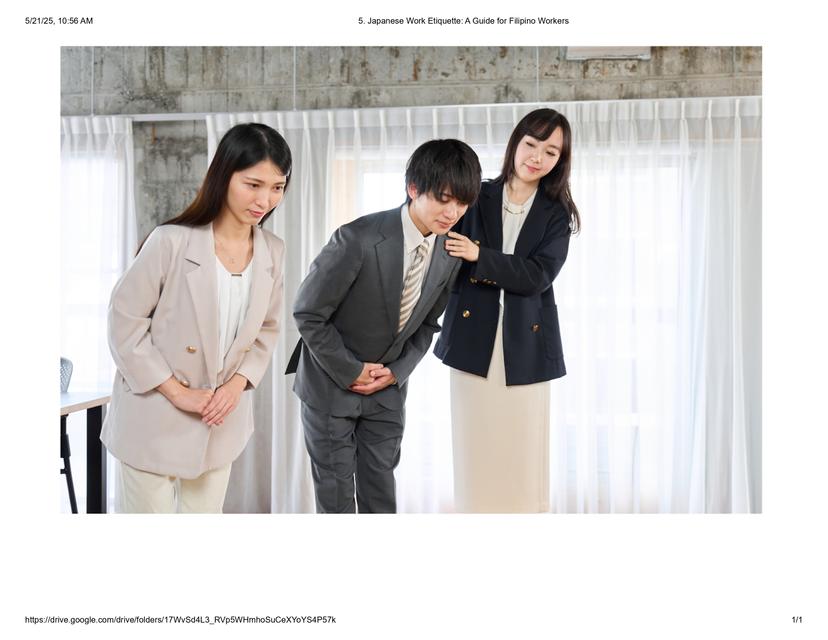Japanese Work Etiquette: A Guide for Filipino Workers

Punctuality is Paramount
In Japan, being on time is a sign of respect and professionalism. Aim to arrive 5–10 minutes before your scheduled meeting or work time. Being late is considered disrespectful and can negatively impact your reputation.
Proper Business Attire
Japanese workplaces value conservative and professional attire.
Men: Dark suits (black, navy, or grey) with white shirts and subdued ties.
Women: Formal business suits or dresses in neutral colors
Avoid flashy accessories and ensure your clothing is clean and well-pressed.
Exchanging Business Cards (Meishi)
The exchange of business cards is a formal ritual in Japan.
-
Present your card with both hands, with the Japanese side facing up.
-
Receive others' cards with both hands and take a moment to read them before placing them carefully on the table.
-
Never write on or fold a received business card.
Understanding Hierarchy and Respect
Japanese workplaces have a clear hierarchical structure.
-
Address superiors with appropriate titles, such as "san" after their surname.
-
Defer to senior staff during meetings and decision-making processes.
-
Show respect through attentive listening and avoiding interruptions.
Communication Style
Japanese communication tends to be indirect and subtle.
-
Pay attention to non-verbal cues and body language.
-
Avoid confrontational language; instead, express disagreements politely.
-
Use formal language and honorifics, especially in professional settings.
Meeting Etiquette
Meetings in Japan are formal and structured.
-
Wait to be seated; guests are usually directed to seats farthest from the door.
-
Accept offered refreshments, such as tea, even if you don't consume them.
-
Take notes during meetings to show attentiveness and respect.
Gift-Giving Practices
Bringing a small gift (omiyage) when meeting someone for the first time is customary.
-
Choose modest, well-packaged items, preferably from your home country.
-
Present the gift with both hands, and don't expect it to be opened immediately.
Dining Etiquette
When dining with colleagues or clients:
-
Wait for everyone to be served before starting to eat.
-
Don't stick chopsticks upright into your rice bowl; it's associated with funerals.
-
Pour drinks for others, and they will reciprocate.
Workplace Conduct
Maintaining harmony and showing dedication are valued in Japanese workplaces.
-
Avoid discussing personal matters at work.
-
Refrain from crossing arms or putting hands in pockets during conversations.
-
Be modest about your achievements and focus on team success.
Continuous Improvement (Kaizen)
Embrace the philosophy of continuous improvement.
-
Seek feedback and look for ways to enhance your skills.
-
Participate in training sessions and be open to new ideas.
-
Demonstrate commitment to personal and professional growth.
Adapting to Japanese work etiquette requires mindfulness and respect for cultural norms. By understanding and practicing these principles, Filipino workers can build strong professional relationships and thrive in Japan's workplace environment.






